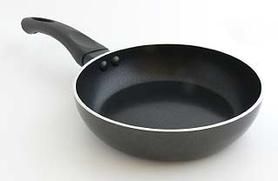In order to learn about this particular connection, I went to the Alzheimer's Society's fact sheet. They say that the link between Alzheimer's disease and aluminum is circumstantial and nothing conclusive has been proven. I also learned that the average Canadian ingests 10 milligrams of aluminum per day. I'd assume its roughly the same for other North Americans. The World Health Organization claims that we can ingest up to 50 milligrams of aluminum per day with no adverse effects.
Also, read this TreeHugger article written by Helen Suh Macintosh professor of environmental health at Harvard University. Basically, she says that the aluminum found in pots and pans isn't really that dangerous and that the amount of aluminum we absorb from cooking with aluminum pots is only 3-6 milligrams. But, she goes on to say that storing acidic foods in aluminum pots and pans is likely to leach more aluminum into the food than usual and not to store foods in such a way. Aluminum, like copper or steel pans, shouldn't be used if there are scrapes or gouges in the pan's cooking surface. It looks like aluminum isn't that dangerous, but worries still linger.
NOTE: Anodized aluminum pans can cook acidic food without any of the leaching problems that regular aluminum has.
